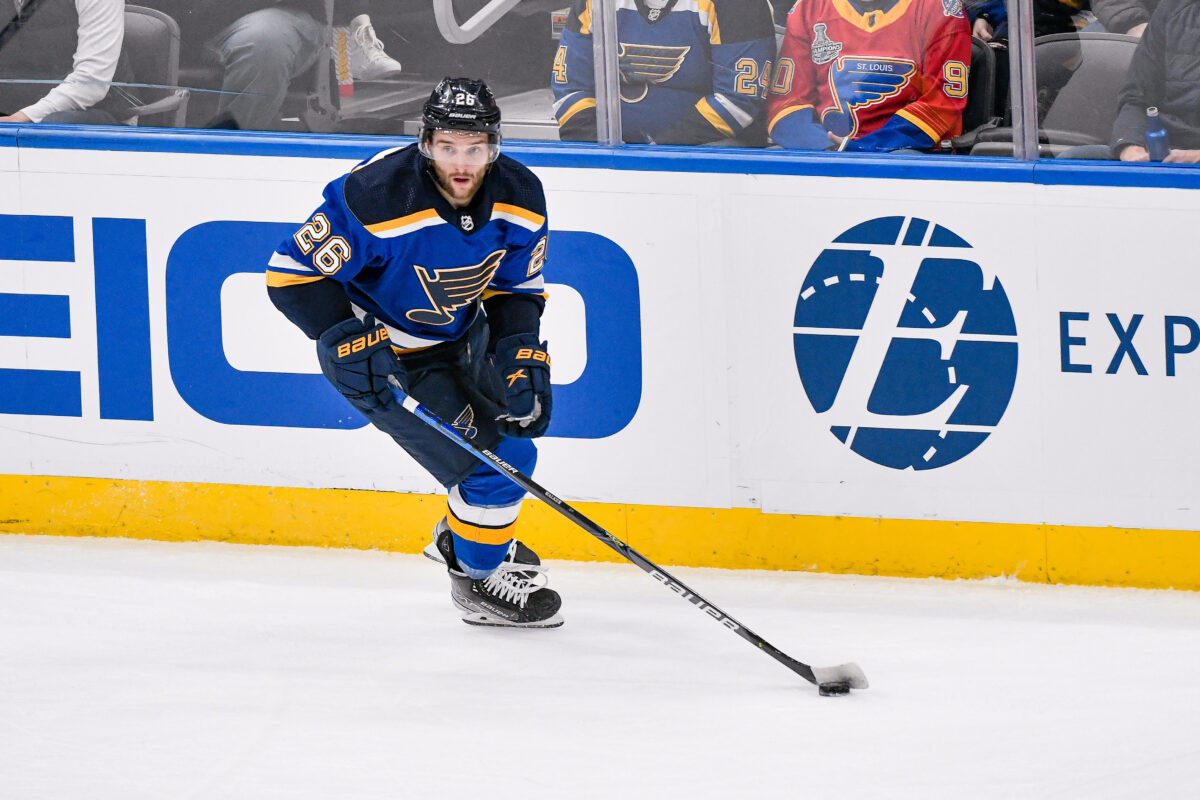Out of all the forwards on the St. Louis Blues, there is one that doesn’t get enough recognition for how important he is to their roster. On Feb. 13, in a 4-1 loss against the Toronto Maple Leafs, Nathan Walker was one of the very few Blues players who continued to battle for the puck, including a big hit on Ryan Reaves. Despite only playing 19 games in the National Hockey League (NHL) this season and playing the best hockey of his career in the AHL (American Hockey League), he’s found a way to prove himself on a Blues team seeking a chance to hang on to a wild card spot, by getting a two-year extension from them on Jan. 9. So, was it worth it to extend him for two more years?
Let’s take a look at why Walker is worth holding on to since his extension.
A Big Hitter for His Size
Being the highly aggressive game that it is, especially around the playoffs, hockey requires the biggest hitters on both the offensive and defensive lines. Usually, the players with the biggest body frames will meet the eyes of scouts and coaches, however, Walker has overcome that part of the game and isn’t the biggest-sized hitter in the league. At 5-foot-9 and 187 pounds, you’d think he’d be “too small” to be considered a checking forward, but his stats in the hits department don’t lie. In his 19 games played with the Blues, he put up 47 hits and averaged the second-highest hits per 60 minutes on the Blues (13.35 hits per game). In the league, Walker’s average hits per game are within the top 50 in hits per 60 minutes amongst players who have played 15 or more games this season.

To reach almost 50 hits in 19 games is pretty impressive for a player of his size and is something the Blues should hold on to if they get a shot at the playoffs by the end of the season. For most of his time on the Blues this season, he’s played the most minutes on a line with Kevin Hayes and Alexey Toropchenko, where he has benefited pretty well so far, allowing no goals when he’s on the ice with them, however as his sample size of games increases I would expect that to change at some point. Nonetheless, he’s been the depth option for the grit that the Blues needed on offense, and as the Trade Deadline is right around the corner, it could give him a chance to be the dominant checking forward on the lineup if Sammy Blais were to be traded at the Trade Deadline.
Related: Blues Have Improved Under Interim Coach Drew Bannister
Contributing Fairly to His Line
Walker is not a highly anticipated point producer, however, it doesn’t mean he hasn’t produced a fair amount of points as a bottom-six forward on the Blues lineup. This season, he’s put up seven points through 19 games played and has a decent faceoff percentage (FO%) of 50.0 percent. Walker mainly produces in little aspects of the game at the NHL level, unlike his AHL career, where he was a 30 to 40-plus-point producer.
He’s been an offensive presence in other aspects, such as on-the-fly zones and is always keeping his feet moving in the play, which is crucial to the Blues right now for goal-scoring and getting the puck moving. Walker has been starting his shifts on the fly about 61.2 percent of the time and is always skating, keeping the puck in the neutral zone a lot. He has the highest neutral zone start percentage on the Blues (24.4 percent) and is second on the Blues in neutral zone faceoff start percentage (50.9 percent).
It was clear that Walker was a strong consideration for a call-up and an extension before he signed with the Blues, and Bannister was behind Walker’s offensive contributions to the lineup. As of right now, I think the Blues will keep him as a bottom-six forward, and I would see him getting some penalty-killing minutes on the second penalty unit with the way he’s been able to move his feet around the neutral zone and prevent any attacks from the opposition. Recently, he’s been decent with his point production, as well, scoring three points in his last five games, including two goals and could be on pace to beat his current career high of 12 points in a season. In his most recent goal against the Nashville Predators on Feb. 17, he was showing a lot of threat near the crease to stay on top of the puck. Nonetheless, Walker is only getting better, and he’s 30 years old.
Final Thoughts
In hindsight, the Blues could stick to him for a while before his value goes up contract-wise, as it’s incredible that he’s signed for an average annual salary (AAV) of $775,000 for a player who plays a strong role as a bottom-six forward and is growing late into his career. It will be even more exciting to see how well he progresses later into the season and hopefully with the opportunity to play in the Stanley Cup playoffs again if the Blues are lucky enough to barely hold on into a wild card spot. The way things are going right now, I think the extension was well worth it for some offensive changes.
